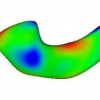Free Online Productivity Tools
i2Speak
i2Symbol
i2OCR
iTex2Img
iWeb2Print
iWeb2Shot
i2Type
iPdf2Split
iPdf2Merge
i2Bopomofo
i2Arabic
i2Style
i2Image
i2PDF
iLatex2Rtf
Sci2ools
112
Voted
ISBI
2008
IEEE
2008
IEEE
Support vector machine for data on manifolds: An application to image analysis
The Support Vector Machine (SVM) is a powerful tool for classification. We generalize SVM to work with data objects that are naturally understood to be lying on curved manifolds, and not in the usual d-dimensional Euclidean space. Such data arise from medial representations (m-reps) in medical images, Diffusion Tensor-MRI (DT-MRI), diffeomorphisms, etc. Considering such data objects to be embedded in higher dimensional Euclidean space results in invalid projections (on the separating direction) while Kernel Embedding does not provide a natural separating direction. We use geodesic distances, defined on the manifold to formulate our methodology. This approach addresses the important issue of analyzing the change that accompanies the difference between groups by implicitly defining the notions of separating surface and separating direction on the manifold. The methods are applied in shape analysis with target data being m-reps of 3 dimensional medical images.
Dimensional Euclidean Space | ISBI 2008 | Medical Imaging | Natural Separating Direction | Separating Direction |
Related Content
| Added | 20 Nov 2009 |
| Updated | 20 Nov 2009 |
| Type | Conference |
| Year | 2008 |
| Where | ISBI |
| Authors | Suman K. Sen, Mark Foskey, James Stephen Marron, Martin Andreas Styner |
Comments (0)

